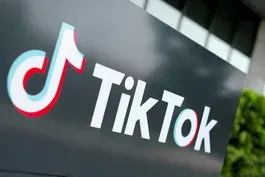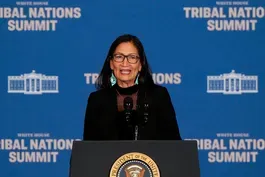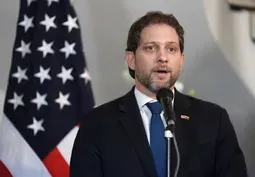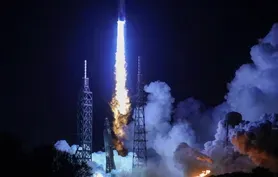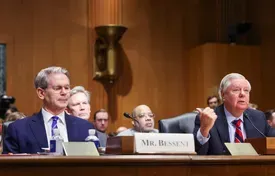
Outgoing ambassador analyzes future of U.S.-China relations
Clip: 1/16/2025 | 7m 51sVideo has Closed Captions
Outgoing Ambassador Nicholas Burns analyzes future of U.S.-China relations
For four years, the Biden Administration has said there is only one country that has both the intention and capacity to reshape the international order in its favor. That country is China. Nick Schifrin spoke with Ambassador Nicholas Burns, the man who had a front-row seat, and helped manage, U.S.-China relations for the Biden administration.
Major corporate funding for the PBS News Hour is provided by BDO, BNSF, Consumer Cellular, American Cruise Lines, and Raymond James. Funding for the PBS NewsHour Weekend is provided by...

Outgoing ambassador analyzes future of U.S.-China relations
Clip: 1/16/2025 | 7m 51sVideo has Closed Captions
For four years, the Biden Administration has said there is only one country that has both the intention and capacity to reshape the international order in its favor. That country is China. Nick Schifrin spoke with Ambassador Nicholas Burns, the man who had a front-row seat, and helped manage, U.S.-China relations for the Biden administration.
How to Watch PBS News Hour
PBS News Hour is available to stream on pbs.org and the free PBS App, available on iPhone, Apple TV, Android TV, Android smartphones, Amazon Fire TV, Amazon Fire Tablet, Roku, Samsung Smart TV, and Vizio.
Providing Support for PBS.org
Learn Moreabout PBS online sponsorshipAMNA NAWAZ: For four years, the Biden administration has said there's only one country that has both the intention and capacity to reshape the international order in its favor.
That country is China.
Nick Schifrin is back now and talks to the man who's had a front-row seat and helped manage U.S.-China relations.
NICK SCHIFRIN: Amna, that man is Nicholas Burns, who has been the Biden administration's ambassador to China since 2022, and joins me now.
Nick Burns, welcome back to the program.
Thanks so much.
NICHOLAS BURNS, U.S.
Ambassador to China: Thanks so much.
NICK SCHIFRIN: The incoming secretary of state, Marco Rubio, said this about China in his confirmation hearing yesterday.
SEN. MARCO RUBIO (R-FL): The Communist Party of China is the most potent and dangerous near-peer adversary this nation has ever confronted.
They have elements that the Soviet Union never possessed.
They are a technological adversary and competitor, an industrial competitor, an economic competitor, a geopolitical competitor, a scientific competitor.
If we stay on the road we're on right now, in less than 10 years, virtually everything that matters to us in life will depend on whether China will allow us to have it or not.
NICK SCHIFRIN: "Industrial competitor, economic competitor, geopolitical competitor.
If we stay on the road we're right now, in less than 10 years, virtually everything that matters to us in life will depend on whether China will allow us to have it or not."
Do you agree?
NICHOLAS BURNS: I agree that we're in a major competition with China.
We're structural rivals.
We're rivals for military power in the Indo-Pacific and we can't afford to be number two.
We're rivals technologically.
Who's going to be first mover in A.I.
and machine learning and quantum computing and biotech?
We have got major problems on the economic side because China's not playing by the rules.
And we have, as you know, Nick, substantial differences in our belief in human freedom and their belief in not giving rights to their own people.
So I agree there's a competition, but the United States has strengthened its position in the Indo-Pacific over the last four years, and we have done it because we have strengthened our alliance with Japan, with the Philippines, with the Republic of Korea, with Australia.
We have invented the AUKUS arrangement, which is going to be a transformative national security military boon to us in the next couple of decades.
So I think we are stronger.
And the Chinese have begun to make mistakes.
So I don't think there's anything inevitable about China overtaking the United States in global power.
I would bet they won't in the next 10 years if we're strong, and if we also keep in touch with them and work with them on some of the global issues that are important, like climate change.
NICK SCHIFRIN: So, as you say, the main part of the U.S. strategy has been to expand the alliances in the region, whether that's gaining access to bases, some of which are close.
NICHOLAS BURNS: Philippines.
NICK SCHIFRIN: In the Philippines, Japan, some of which are close to Taiwan, improving relations with and between Japan, South Korea, Philippines, Australia, as you said, AUKUS, nuclear submarines.
And yet China's aggressive behavior, whether around Taiwan, whether toward the Philippines, whether hacking into the United States' telecommunications grid or critical infrastructure, has continued.
So does that mean that U.S. policy has failed to change Chinese behavior?
NICHOLAS BURNS: I don't think so.
In some respects -- you mentioned South China Sea.
The Chinese have tried to intimidate the Filipinos over the past year, especially this past summer.
The United States stood up to China.
We have a 1951 mutual defense treaty with the Philippines, and we told the Chinese time and again, if you use physical force, military force, which they did not do, against the Philippines, you're going to draw us into that.
And I think we deterred them.
We have also built up the military capacity of Taiwan through arms transfers, and, as you said, Japan and the Philippines, much more focused on that problem as well.
And you have now seen the European countries begin to act strategically in opposition to what China is trying to do, because China, of course, has been the major ally of Russia in the Ukraine war.
So I think the Chinese have miscalculated on some of this.
Have we resolved every problem with China?
No.
I spent three years trying to do that.
But the suggestion that somehow the United States is going to be overtaken in power by China in the next 10 years, I don't see it happening.
NICK SCHIFRIN: Let's bring us to Taiwan.
President Lai Ching-te of Taiwan says that the island doesn't have to declare independence from mainland China -- quote -- "We are already independent."
Is that semantics or is that provocative to Beijing?
NICHOLAS BURNS: Well, it depends who's listening to it and who's commenting to it.
I think it was provocative in some ways to the Chinese authorities, but we have told the Chinese, you need to commit -- this is the mainland Chinese -- you need to commit to a peaceful resolution of this dispute.
And there are a lot of countries that want to make sure that Taiwan has a deterrent, and 50 percent of global container traffic flows through the Taiwan Strait on a monthly basis.
NICK SCHIFRIN: But you have simultaneously had to also restrain William Lai, the president of Taiwan, not to go farther than he already has, right?
NICHOLAS BURNS: Well, the United States has been clear we do not support Taiwan independence.
And what's remarkable about the Taiwan policy, Nick, is, since 1972, there's been a consistent policy that has worked and has kept the peace by every administration of both parties.
So I think we did well to send the right signals on Taiwan.
NICK SCHIFRIN: China faces significant economic headwinds.
The number of PLA Chinese military officers fired for corruption seems to suggest that Xi Jinping is worried about corruption.
Do you believe that Xi Jinping's confidence is waning about the Chinese military's ability to be able to invade or blockade Taiwan by 2027?
NICHOLAS BURNS: It has to be part of the calculation, the problem they have got in thinking about a major -- if this is one option for them, a major cross-strait operation.
He fired and put on trial for corruption the two commanders are the rocket forces and, more recently, in the last 30 days, the senior admiral in the Chinese navy.
When Xi Jinping came in 12 years ago, he launched an anti-corruption campaign.
And there was this feeling that somehow this was going to be just the opening salvo.
It's been permanent.
And there have been hundreds of thousands of Chinese officials put behind bars.
NICK SCHIFRIN: Is his confidence waning, do you think?
NICHOLAS BURNS: Well, it's hard to know personally what he thinks, although we have spent a lot of time with him.
President Biden did in Lima six - - two weeks ago -- two months ago.
Excuse me.
But they have got to be concerned by a military that has never done a combined forces operation of this type.
So we just need to continue to be steady in leading the rest of the world to advise the Chinese, you can't use force.
There'd be a huge price to pay for that in terms of China's reputation.
And, of course, we're going to continue arming Taiwan.
NICK SCHIFRIN: Finally, quickly, president-elect Trump has refused to rule out military or economic coercion on Greenland and Panama.
Perhaps it's rhetoric, but how does Beijing hear that talk?
And just in about 30 seconds we have left, how does it affect the U.S. arguments about Taiwan?
NICHOLAS BURNS: Well, basically, the message to Putin and Xi Jinping, you can't take over someone else's country, you can't cross borders by the use of force.
So it sends the wrong signal to Xi Jinping.
And, Nick, I was ambassador to NATO.
On 9/11, the first country that came to support us was Canada.
Denmark supported us.
These are great allies of the United States, and we Americans built a world order on sovereignty, inviolability of countries' borders and respect your allies.
The biggest difference between the United States and China right now, China has no allies.
We have the NATO allies and the East Asian allies.
So that's the difference-maker, and we should respect the sovereignty of our allied countries.
NICK SCHIFRIN: Nick Burns, the outgoing U.S. ambassador to China, thank you very much.
NICHOLAS BURNS: Thank you, Nick.
Clock ticking on TikTok with ban coming this weekend
Video has Closed Captions
The clock is ticking on TikTok with potential ban coming this weekend (6m 1s)
Deb Haaland on Biden's efforts to preserve public land
Video has Closed Captions
Deb Haaland on Biden's efforts to preserve public land and recognize Indigenous history (6m 20s)
Gazans hope ceasefire deal will bring lasting peace
Video has Closed Captions
Israeli vote on ceasefire delayed as Gazans hope deal will bring lasting peace (4m 33s)
Jon Finer breaks down strategy to reach Gaza ceasefire deal
Video has Closed Captions
White House official Jon Finer breaks down strategic steps to reach Gaza ceasefire deal (7m 46s)
LA bands together to help in midst of wildfire devastation
Video has Closed Captions
LA residents band together to help in midst of wildfire devastation (5m 13s)
News Wrap: Blue Origin launches New Glenn rocket
Video has Closed Captions
News Wrap: Blue Origin successfully launches New Glenn rocket (7m 23s)
Trump’s Cabinet picks face questions in Thursday's hearings
Video has Closed Captions
The questions Trump’s Cabinet picks faced in Thursday's confirmation hearings (6m 43s)
Providing Support for PBS.org
Learn Moreabout PBS online sponsorshipMajor corporate funding for the PBS News Hour is provided by BDO, BNSF, Consumer Cellular, American Cruise Lines, and Raymond James. Funding for the PBS NewsHour Weekend is provided by...

